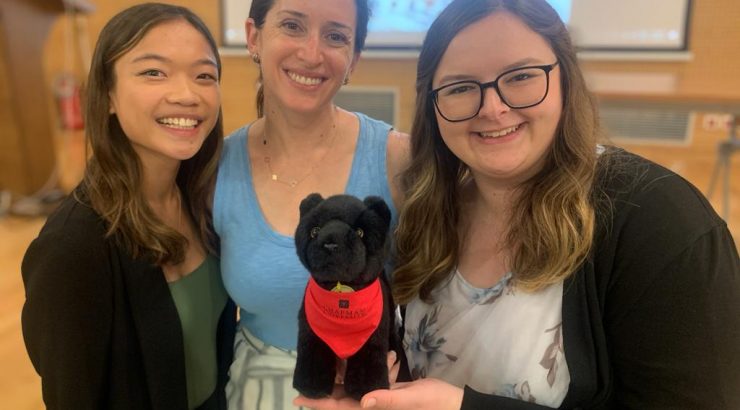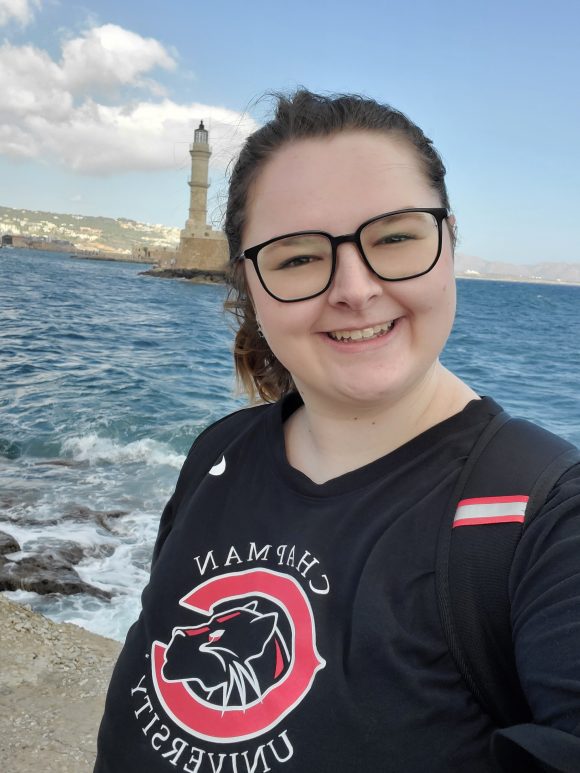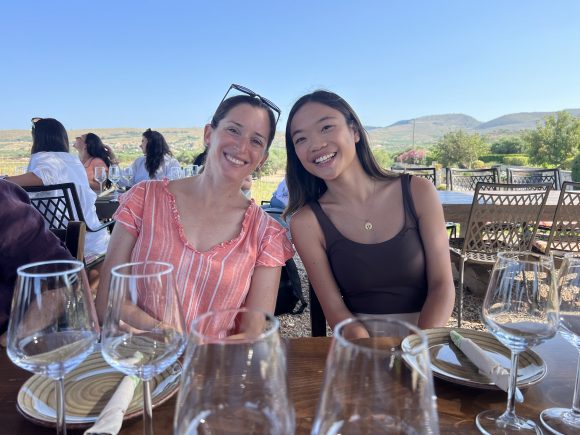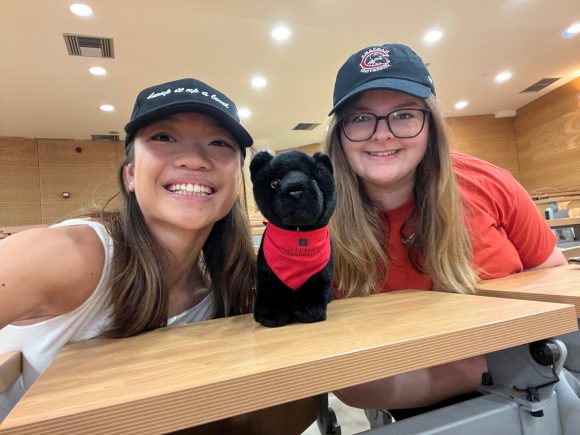
Graduate Education Abroad: Health Communication & Inequalities in Across Health Professions Noel McGuire's and Cailin Kuchenbecker's experience in a five-week service-learning fellowship in Crete, Greece
July 24, 2023
This past June, Ph.D. candidates Noel McGuire and Cailin Kuchenbecker traveled to Greece to participate in a five-week service-learning fellowship in Crete. The Health Communication & Health Inequalities Across the Health Professions in Greece and the U.S. program is a study abroad opportunity hosted by Rutgers University and was brought to the School of Communication by Dr. Vikki Katz. The program was designed to investigate how health disparities and inequities affect ethnic and racial minorities, immigrants, refugees, and rural populations in both Greece and the U.S.A.

Cailin Kuchenbecker
“My advisor, Dr. Hannah Ball, reached out to me about this program as it fits my line of research quite nicely. I study missing person messages in the media, and substantial inequalities, in media coverage specifically, exist for many missing persons who come from certain communities, and I knew I needed to apply.” Kuchenbecker said. “After going through the application process, including an interview with the program directors at Rutgers University, I was selected for the program.”
“I am very grateful to the School of Communication for funding this once-in-a-lifetime opportunity,” Cailin added. “The fieldwork I was able to conduct in Greece and the United States has added tremendous value to my graduate education.”

Noel McGuire and Dr. Katz
McGuire also learned about the program through a School of Communication faculty member. “As someone who used to work in Global Education, I was incredibly excited that a program like this was available to the SoC graduate students. There are just some things you have to learn by actually seeing and doing yourself,” McGuire reflected. “But, I have to admit, I was hesitant when I received the email from Dr. Katz encouraging me to apply because, financially, I just wasn’t in a place where I could participate.” However, Katz informed her that the School of Communication provided full program scholarships to two qualified graduate students to participate in the program, making her able to participate in the opportunity.
Fieldwork in Crete, Greece
As a large portion of the service-learning fellowship, McGuire and Kuchenbecker conducted fieldwork in Crete, which gave them the chance to visit several communities experiencing health inequities and to personally speak with the individuals impacted. Among the scheduled trips were visits to an elder care facility, the local Roma community, and an unaccompanied minor refugee center. McGuire and Kuchenbecker worked in multidisciplinary teams with health communication scholars, practicing clinicians, and social workers from both Rutgers University and the Hellenic Mediterranean University (a university based in Heraklion, Crete) to diagnose public health challenges in local communities and develop proposals for how to solve them.

Participants of the program
“The most impactful experience I had was getting to work with an interdisciplinary team on health disparities affecting the unaccompanied refugee minor population in Crete, Greece. These minors are in Greece alone, separated from their families due to war and tragedy, and face tremendous hurdles as they navigate the transition into adulthood. Witnessing the resilience of these minors who have experienced so much in their short lives was inspirational and motivated my team to develop a bicultural intervention to address their mental health needs,” Kuchenbecker said. “Not only was I able to gain experience working with an interdisciplinary and international team of a social worker, health communication scholar, nutritionist, and occupational therapist from the United States and Greece, but I also gained experience creating an intervention meant for a specific population with specific and measurable outcomes.”
Similarly, McGuire was inspired by the work being done by visual artist and filmmaker Evangelia Goula. Students were given the opportunity to meet with Goula after having viewed her two documentaries which capture how racial stereotypes and discrimination have negatively impacted Crete’s Roma population’s access to care. “Getting the chance to talk with Evangelia was incredible,” McGuire said. “My primary area of research really looks at how we can use the power of media to create positive change, so it was really inspiring to see how it works in practice.” As their final project, McGuire and her team designed a health intervention aimed to educate primary school children on the importance of practicing empathy and designed empathy skill-building exercises that can be utilized in Greek school systems in an effort to destigmatize Roma children.
The Program’s Impact and Advancement in Graduate Education

Noel McGuire and Cailin Kuchenbecker
Both McGuire and Kuchenbecker expressed how much they felt this program has not only advanced their skills as researchers but has also given them a new perspective on how to approach their own work as they prepare to enter their final year of the School of Communication’s Ph.D. program. Kuchenbecker states, “Getting to present this proposed intervention to community leaders was also an invaluable opportunity that prepares me for a variety of different health communication endeavors I will encounter in my career. I am very grateful for this experience.”
“This program was moving, inspiring, and just amazing on so many levels,” McGuire added. “I was touched by all the hard work people are doing in an effort to make a difference and am so grateful to have had the chance to learn from and alongside them.”
The School of Communication is hopeful to continue partnering with Rutgers University for next year’s Health Communication & Health Inequalities Across the Health Professions summer program, which is currently planned to take place in Puerto Rico.

